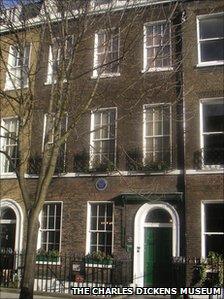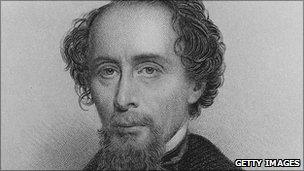Charles Dickens Museum in Bloomsbury given £2m grant
- Published

Charles Dickens lived in the house for two years
The central London house where Charles Dickens wrote The Pickwick Papers and Oliver Twist has been given a £2m grant by the Heritage Lottery Fund.
He lived in the Doughty Street property in Bloomsbury for two years before moving to a house in Regent's Park.
It was converted into a museum in 1925 and his study and the desk where he penned the novels have been preserved.
The money from the grant will be used to restore the 19th Century townhouse and double the exhibition space.
The museum - where Dickens lived from 1837 to 1839 - contains more than 10,000 books, documents and manuscripts relating to the life of the author who depicted the Victorian life and times in his novels.
Shannon Hermes, manager of the Charles Dickens Museum, said: "For us it is a very positive decision and the funds are very much needed to restore the museum and ensure it continues to stay open and houses Dickens's work."
Dame Jenny Abramsky, chairwoman of the Heritage Lottery Fund, said: "The £2m investment from the Heritage Lottery Fund will help radically transform not just the building itself but the way people experience and learn about this internationally-revered literary master."
Philip Pullman, author of the His Dark Materials trilogy, welcomed the grant.
"Everyone who visits will benefit from a closer acquaintance with this most English, but most universal, of authors.

Dickens moved his family to larger quarters near Regent's Park after leaving the Bloomsbury house
"It deserves the support of the nation."
Four other projects were given initial support by the Lottery Fund, a first step towards receiving a full grant.
House Mill, the largest remaining tidal mill in the world, in Bromley-by-Bow, east London, has been given preliminary approval for a £2.65m grant, including an immediate £248,000 to develop restoration plans.
Castle Drogo, in Exeter, Devon, the last castle built in England, was given a first-round pass of £2.5m, while the Railway Preservation Society of Ireland was given initial support for a £1.8m grant, including £165,000 in development funding.
Dunfermline, the Scottish capital between the 11th and 15th centuries, was given initial support for a £2.8m grant, of which £24,000 was given immediately. A heritage and cultural centre is being planned in the town.
- Published27 October 2010